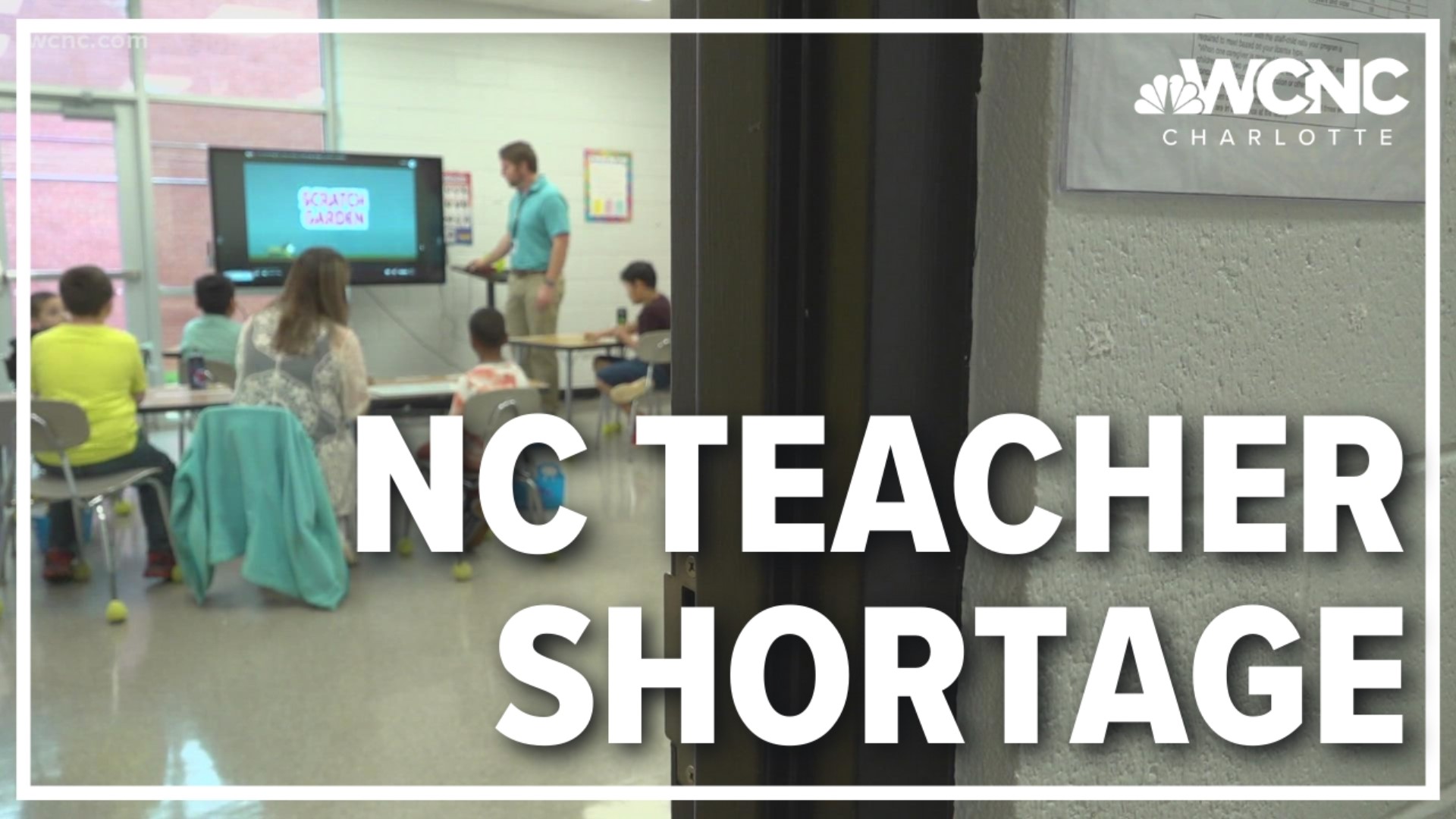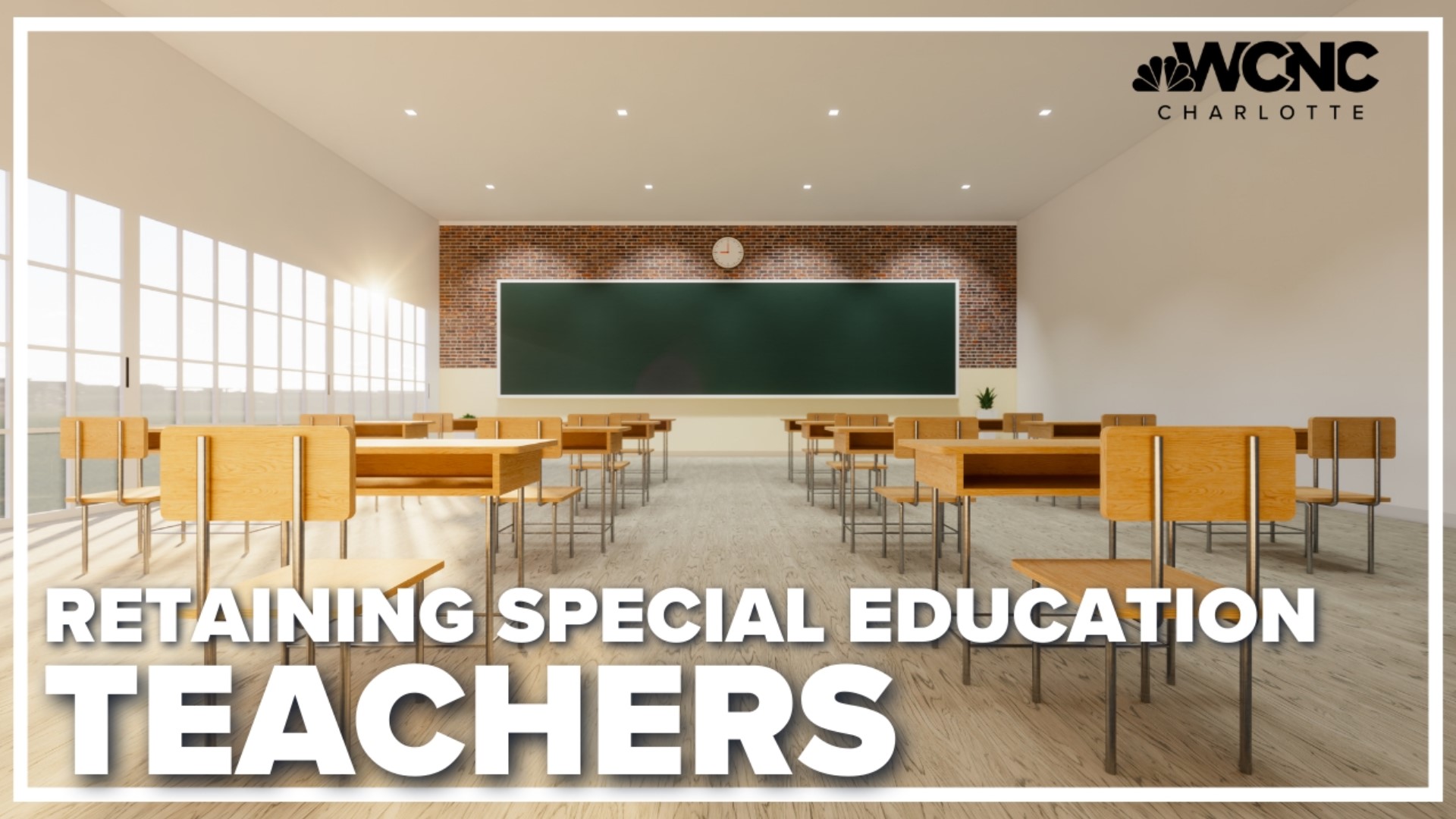CATAWBA COUNTY, N.C. — Many school districts in the Charlotte area are looking for teachers that can work with students who have special needs. Clyde Campbell Elementary School in Catawba County is working hard to keep the ones they have.
The school’s special education team works in a wing known as the adapted curriculum cluster classrooms. It’s built to make children with all abilities comfortable and to make learning easier.
“It does get difficult sometimes, there are days when I have to walk out, take deep breaths, and it does get challenging," said teacher Jessica Hammond, "but the kids truly make me stay just the fun moments of the day."
The students that need these kinds of classrooms and teachers are deemed Exceptional Children, or EC. Some children are non-verbal. Others may have physical challenges or some learning disabilities.
In North Carolina, the teachers who guide them must have a degree in Special Education or a related field. They also need the appropriate state license.
"They are very active, they are not a quiet class going to sit for 30 minutes at a time," said Matt Hastings, another EC teacher at Clyde Campbell, "and they're going to work but there's going to be interaction, we have to move, we have to get up and do things and keep them involved.”
The U.S. Department of Education shows North Carolina is facing a teacher shortage in several subjects. The biggest shortage is in teachers who work with children deemed Exceptional Students, like the ones in the adapted curriculum clusters at Clyde Campbell.
Beyond the need for more teachers who can specialize in special education, North Carolina is facing a shortage of all kinds of teachers in all grade levels.
Districts like Charlotte-Mecklenburg Schools are recognizing this problem. In their most recent budget proposal for the 2022-2023 school year, the superintendent is proposing to use additional federal funds to offer a $200 monthly stipend to these teachers in addition to a $2,500 dollar sign-on bonus.
CMS district leaders are also proposing to reduce paperwork for EC teachers to allow additional focus on direct instruction. The job comes with an extensive amount of paperwork to track the childrens’ social, mobile and intellectual development.
"Sometimes with the paperwork, it can be very demanding and you want to have accurate paperwork, obviously, you want to have as detailed as possible," said Hastings, "but at the same time, you don't want that to take away from the interaction and the relationships you build with kids."
Hastings said the support from his administration at Catawba County Schools helps him find balance. Specifically, top-level support is crucial to him to keep people in the demanding field.
“I think it takes strong communication, we try to really have a lot of conversations on a daily basis about how our children are doing, what type of support they need," said Ryan McCreary, the principal at Clyde Campbell.
The school also provides individual support staff to help work with special education teachers. That includes teaching assistants, speech pathologists, and occupational and physical therapy specialists.
"There's very few people that go to work excited every day and happy every day and know that it's going to be a great day, more than likely," Hastings said.
Recruiting and retaining teachers for this critical work is vital for the future of the students’ lives outside the school's four walls. And during the pandemic, disruption has been especially noticeable.
Learning Losses for children with disabilities
The U.S. Department of Education's civil rights division has said COVID-19’s impacts have fallen unevenly on school-age children with disabilities.
In a 2021 report, the department said COVID-19’s disruptions to their education are exacerbating longstanding disability-based disparities in academic achievement.
Clyde Campbell Elementary School has a special education program seeking solutions to getting its students back on track.
“To work with the kids each day and to see their progress and to have those little breakthrough moments when they are working on a goal," said Laura Caudle, a speech therapist at the school. "And they're finally starting to say a specific sound or starting to communicate with you.”
In the adapted curriculum cluster classrooms, students are able to get the support they need. Some communicate with sign language and others may use soundboards. The goal is to have specialized learning for each student who has different levels of verbal, social, and intellectual learning abilities.
During the school closures and pivots to virtual learning at the onset of the pandemic, some students with disabilities were unable to access hands-on support from specialized staff.
“Parents still had to work, parents still had to do everyday life. The biggest challenge for us was just having somebody available for them to be able to help them access," said Jessica Hammond, an EC teacher at Clyde Campbell.
Due to a waiver by the North Carolina General Assembly, there’s no assessment data for how special education students fared for the past two school years. But thankfully, the staff at Clyde Campbell said their students are either at or just above their abilities pre-COVID.
Hammond led the virtual learning instruction and says it came with some positives.
“You were able to get more of a one-on-one thing than you were like in the classroom," she said.
But having students in the classroom remains ideal.
“They've missed out on a lot with that, and just that interaction with their peers, and with other teachers, other adults in the building,” said Rachel Toscano, a speech therapist at the school.
To integrate the kids back into the daily flow, they're working with social learning activities like the Cougar Cafe.
"The students in Mrs. Hammond and Mr. Hastings' class are going to go around and help us serve coffee to the teachers," Toscano said.
Students and teachers will work on functional life skills like introductions and social cues. The district's occupational therapist is also helping students progress.
"It's important for kids to be able to access all areas of their school environment, and then that transition to the community and for when they graduate and move on from the school environment," said Jennifer Strong the lead physical therapist for Catawba County Schools.
The team said they must continue analyzing where the kids are and finding opportunities to improve.
Contact Shamarria Morrison at smorrison@wcnc.com and follow her on Facebook, Twitter and Instagram.
WCNC Charlotte is committed to reporting on the issues facing the communities we serve. We tell the stories of people working to solve persistent social problems. We examine how problems can be solved or addressed to improve the quality of life and make a positive difference. WCNC Charlotte is seeking solutions for you. Send your tips or questions to newstips@wcnc.com.


